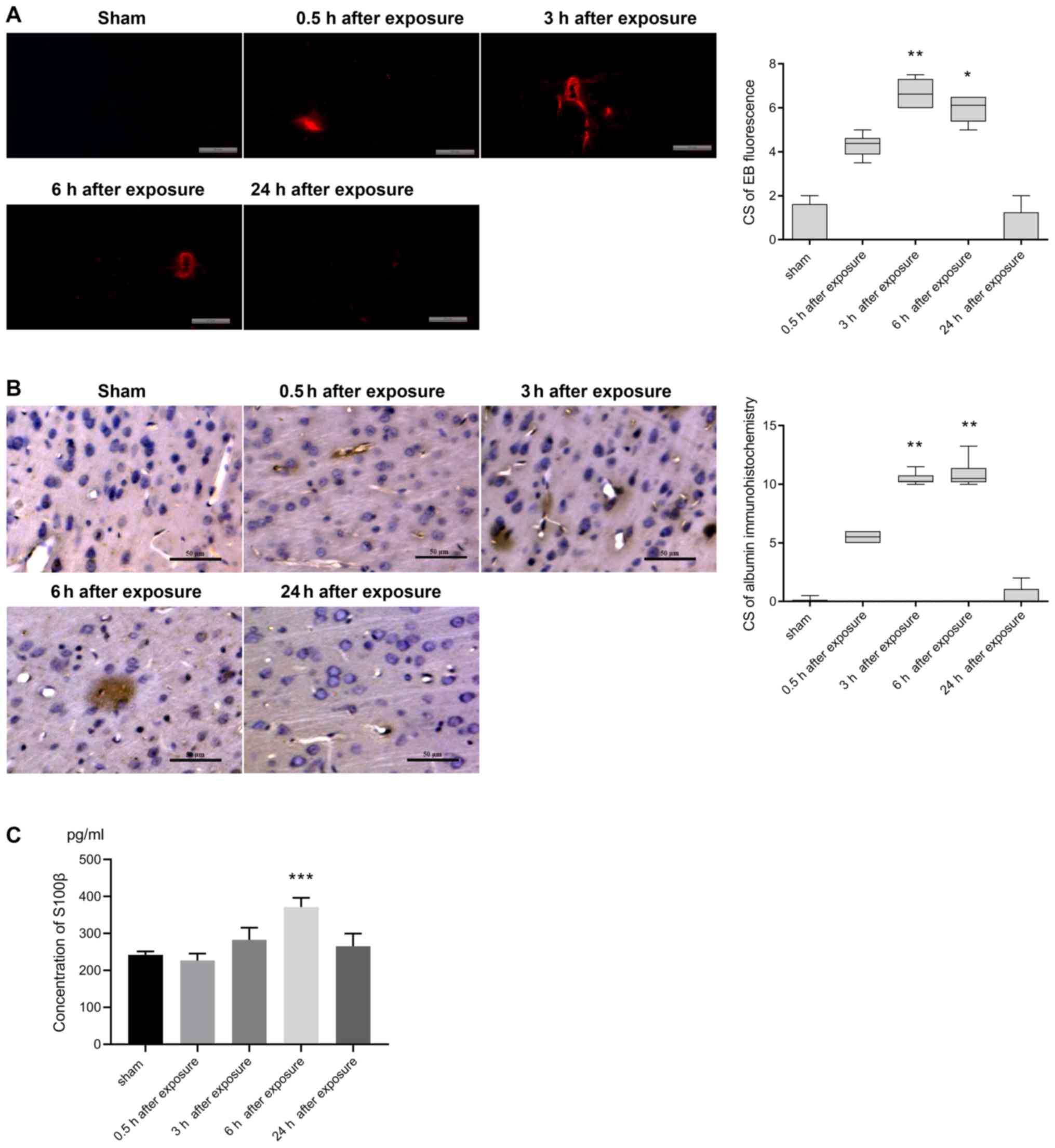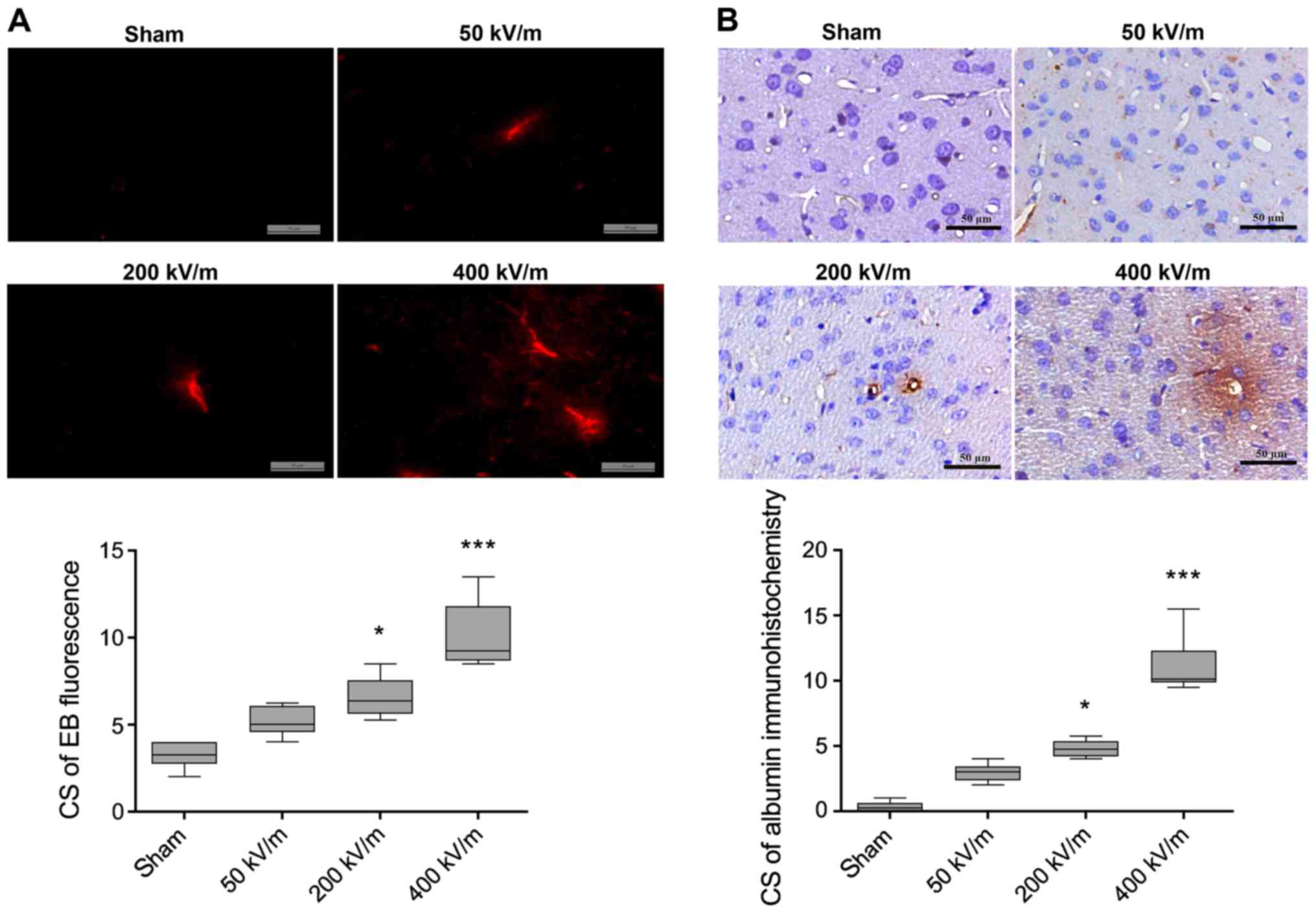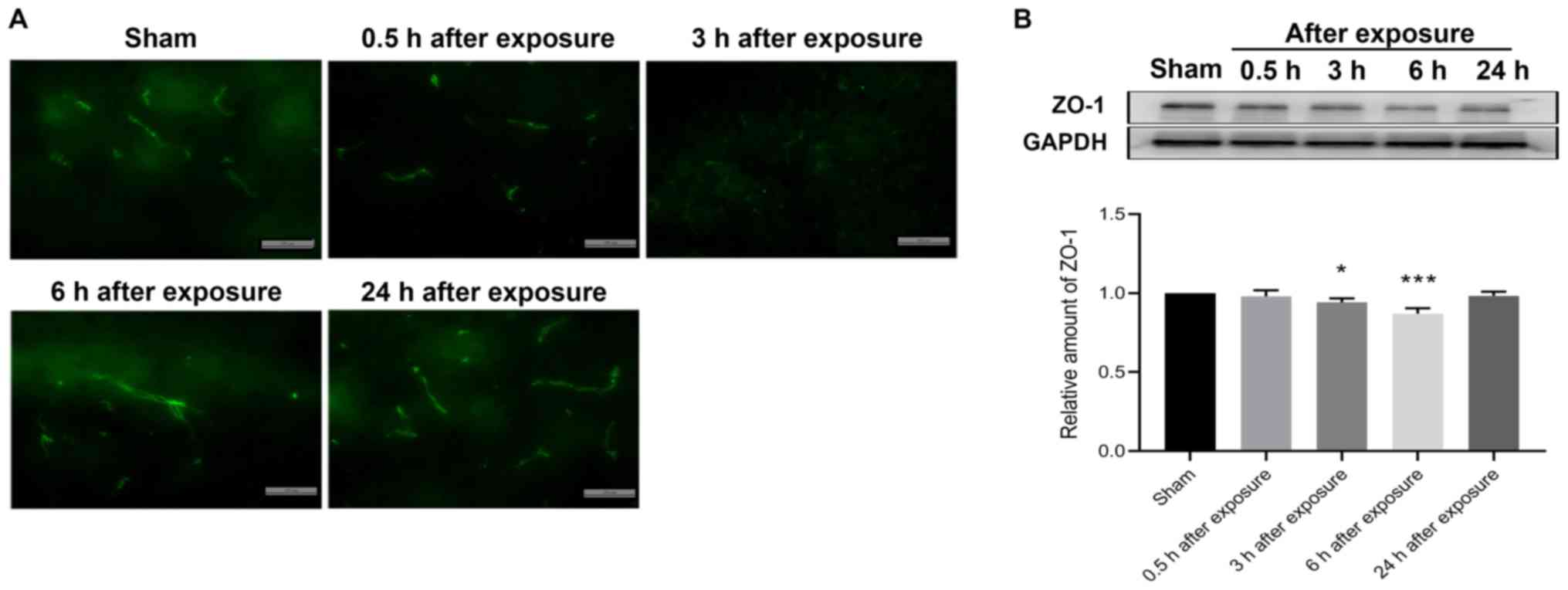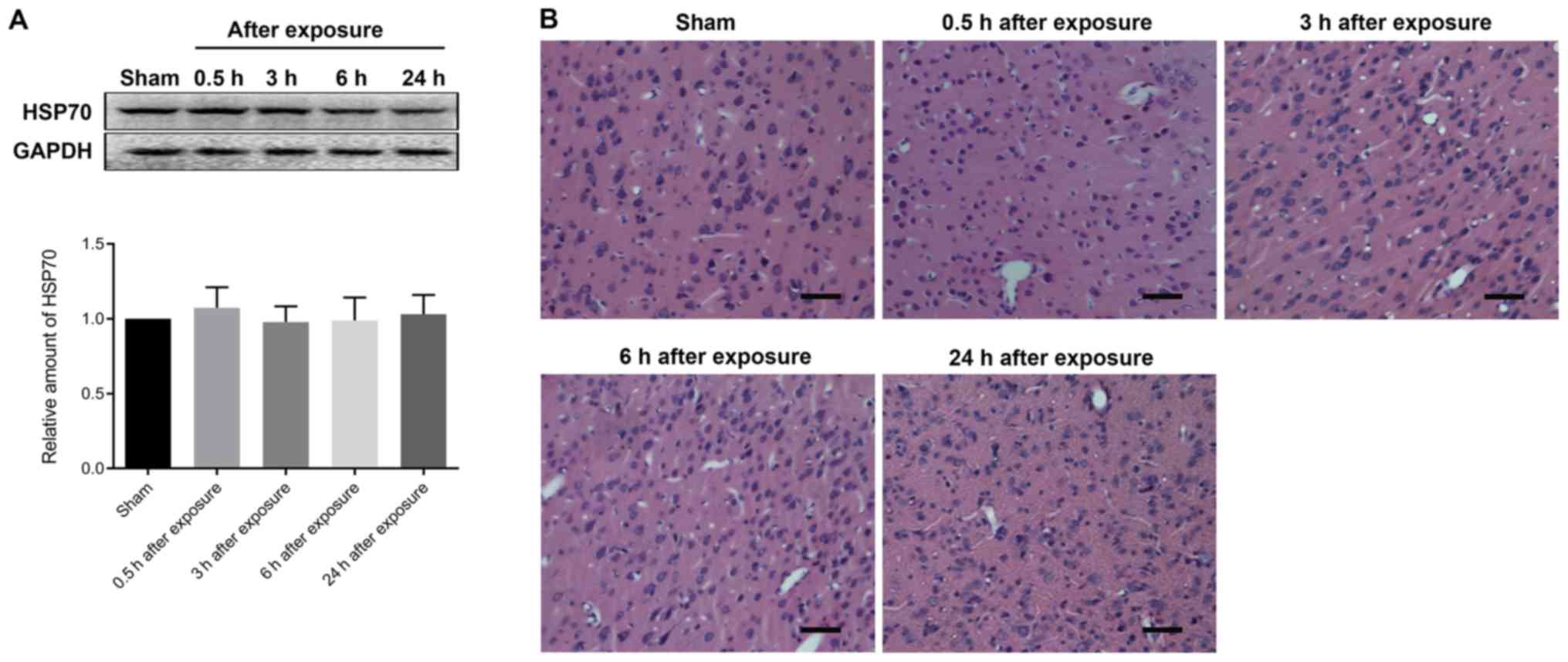|
1
|
Hahad O, Lelieveld J, Birklein F, Lieb K,
Daiber A and Munzel T: Ambient air pollution increases the risk of
cerebrovascular and neuropsychiatric disorders through induction of
inflammation and oxidative stress. Int J Mol Sci. 21:27752020.
View Article : Google Scholar
|
|
2
|
The Lancet Neuroiogy: Global analysis of
neurological disease: Burden and benefit. Lancet Neurol.
16:8572017. View Article : Google Scholar : PubMed/NCBI
|
|
3
|
Ostrom QT, Gittleman H, Liao P, Rouse C,
Chen Y, Dowling J, Wolinsky Y, Kruchko C and Barnholtz-Sloan J:
CBTRUS statistical report: Primary brain and central nervous system
tumors diagnosed in the United States in 2007–2011. Neuro Oncol. 16
(Suppl 4):iv1–iv63. 2014. View Article : Google Scholar : PubMed/NCBI
|
|
4
|
Arvanitis CD, Ferraro GB and Jain RK: The
blood-brain barrier and blood-tumour barrier in brain tumours and
metastases. Nat Rev Cancer. 20:26–41. 2019. View Article : Google Scholar : PubMed/NCBI
|
|
5
|
Hawkins BT and Davis TP: The blood-brain
barrier/neurovascular unit in health and disease. Pharmacol Rev.
57:173–185. 2005. View Article : Google Scholar : PubMed/NCBI
|
|
6
|
Tang Z, Guo D, Xiong L, Wu B, Xu X, Fu J,
Kong L, Liu Z and Xie C: TLR4/PKCα/occludin signaling pathway may
be related to blood-brain barrier damage. Mol Med Rep.
18:1051–1057. 2018.PubMed/NCBI
|
|
7
|
Lee MR and Jayant RD: Penetration of the
blood-brain barrier by peripheral neuropeptides: New approaches to
enhancing transport and endogenous expression. Cell Tissue Res.
375:287–293. 2019. View Article : Google Scholar : PubMed/NCBI
|
|
8
|
Zhao Z, Nelson AR, Betsholtz C and
Zlokovic BV: Establishment and dysfunction of the blood-brain
barrier. Cell. 163:1064–1078. 2015. View Article : Google Scholar : PubMed/NCBI
|
|
9
|
Zhan W and Wang CH: Convection enhanced
delivery of chemotherapeutic drugs into brain tumour. J Control
Release. 271:74–87. 2018. View Article : Google Scholar : PubMed/NCBI
|
|
10
|
Parodi A, Rudzinska M, Deviatkin AA, Soond
SM, Baldin AV and Zamyatnin AA Jr: Established and emerging
strategies for drug delivery across the blood-brain barrier in
brain cancer. Pharmaceutics. 11:2452019. View Article : Google Scholar
|
|
11
|
McDannold N, Zhang Y, Supko JG, Power C,
Sun T, Peng C, Vykhodtseva N, Golby AJ and Reardon DA: Acoustic
feedback enables safe and reliable carboplatin delivery across the
blood-brain barrier with a clinical focused ultrasound system and
improves survival in a rat glioma model. Theranostics. 9:6284–6299.
2019. View Article : Google Scholar : PubMed/NCBI
|
|
12
|
Semyachkina-Glushkovskaya O, Chehonin V,
Borisova E, Fedosov I, Namykin A, Abdurashitov A, Shirokov A,
Khlebtsov B, Lyubun Y, Navolokin N, et al: Photodynamic opening of
the blood-brain barrier and pathways of brain clearing. J
Biophotonics. 11:e2017002872018. View Article : Google Scholar : PubMed/NCBI
|
|
13
|
Ding GR, Qiu LB, Wang XW, Li KC, Zhou YC,
Zhou Y, Zhang J, Zhou JX, Li YR and Guo GZ: EMP-induced alterations
of tight junction protein expression and disruption of the
blood-brain barrier. Toxicol Lett. 196:154–160. 2010. View Article : Google Scholar : PubMed/NCBI
|
|
14
|
McMahon D, Poon C and Hynynen K:
Evaluating the safety profile of focused ultrasound and
microbubble-mediated treatments to increase blood-brain barrier
permeability. Expert Opin Drug Deliv. 16:129–142. 2019. View Article : Google Scholar : PubMed/NCBI
|
|
15
|
Kimura S, Kuroiwa T, Ikeda N, Nonoguchi N,
Kawabata S, Kajimoto Y and Ishikawa T: Assessment of safety of
5-aminolevulinic acid-mediated photodynamic therapy in rat brain.
Photodiagnosis Photodyn Ther. 21:367–374. 2018. View Article : Google Scholar : PubMed/NCBI
|
|
16
|
Zhou JX, Ding GR, Zhang J, Zhou YC, Zhang
YJ and Guo GZ: Detrimental effect of electromagnetic pulse exposure
on permeability of in vitro blood-brain-barrier model. Biomed
Environ Sci. 26:128–137. 2013.PubMed/NCBI
|
|
17
|
Zhou Y, Qiu LB, An GZ, Zhou JX, Du L, Ma
YH, Guo GZ and Ding GR: Effects of electromagnetic pulse exposure
on gelatinase of blood-brain barrier in vitro. Electromagn Biol
Med. 36:1–7. 2017.PubMed/NCBI
|
|
18
|
Li K, Zhang K, Xu S, Wang X, Zhou Y, Zhou
Y, Gao P, Lin J, Ding G and Guo G: EMP-induced BBB-disruption
enhances drug delivery to glioma and increases treatment efficacy
in rats. Bioelectromagnetics. 39:60–67. 2018. View Article : Google Scholar : PubMed/NCBI
|
|
19
|
Liang X, Wang Y, Wu S and Gulliver TA:
Experimental study of wireless monitoring of human respiratory
movements using UWB impulse radar systems. Sensors (Basel).
18:30652018. View Article : Google Scholar
|
|
20
|
National Research Council (US) Committee
for the Update of the Guide for the Care and Use of Laboratory
Animals: Guide for the care and use of laboratory animals. 8th.
Washington (DC): National Academies Press (US); 2011
|
|
21
|
Jiang DP, Li J, Zhang J, Xu SL, Kuang F,
Lang HY, Wang YF, An GZ, Li JH and Guo GZ: Electromagnetic pulse
exposure induces overexpression of beta amyloid protein in rats.
Arch Med Res. 44:178–184. 2013. View Article : Google Scholar : PubMed/NCBI
|
|
22
|
Wang HL and Lai TW: Optimization of evans
blue quantitation in limited rat tissue samples. Sci Rep.
4:65882014. View Article : Google Scholar : PubMed/NCBI
|
|
23
|
Liu WY, Wang ZB, Zhang LC, Wei X and Li L:
Tight junction in blood-brain barrier: An overview of structure,
regulation, and regulator substances. CNS Neurosci Ther.
18:609–615. 2012. View Article : Google Scholar : PubMed/NCBI
|
|
24
|
Oscar KJ and Hawkins TD: Microwave
alteration of the blood-brain barrier system of rats. Brain Res.
126:281–293. 1977. View Article : Google Scholar : PubMed/NCBI
|
|
25
|
Albert EN and Kerns JM: Reversible
microwave effects on the blood-brain barrier. Brain Res.
230:153–164. 1981. View Article : Google Scholar : PubMed/NCBI
|
|
26
|
Zhang YM, Zhou Y, Qiu LB, Ding GR and Pang
XF: Altered expression of matrix metalloproteinases and tight
junction proteins in rats following PEMF-Induced BBB permeability
change. Biomed Environ Sci. 25:197–202. 2012.PubMed/NCBI
|
|
27
|
Tang J, Zhang Y, Yang L, Chen Q, Tan L,
Zuo S, Feng H, Chen Z and Zhu G: Exposure to 900 MHz
electromagnetic fields activates the mkp-1/ERK pathway and causes
blood-brain barrier damage and cognitive impairment in rats. Brain
Res. 1601:92–101. 2015. View Article : Google Scholar : PubMed/NCBI
|
|
28
|
Wang LF, Li X, Gao YB, Wang SM, Zhao L,
Dong J, Yao BW, Xu XP, Chang GM, Zhou HM, et al: Activation of
VEGF/Flk-1-ERK pathway induced blood-brain barrier injury after
microwave exposure. Mol Neurobiol. 52:478–491. 2015. View Article : Google Scholar : PubMed/NCBI
|
|
29
|
Sirav B and Seyhan N: Effects of GSM
modulated radio-frequency electromagnetic radiation on permeability
of blood-brain barrier in male & female rats. J Chem Neuroanat.
75:123–127. 2016. View Article : Google Scholar : PubMed/NCBI
|
|
30
|
Soderqvist F, Carlberg M and Hardell L:
Use of wireless telephones and serum S100B levels: A descriptive
cross-sectional study among healthy Swedish adults aged 18–65
years. Sci Total Environ. 407:798–805. 2009. View Article : Google Scholar : PubMed/NCBI
|
|
31
|
Soderqvist F, Carlberg M and Hardell L:
Biomarkers in volunteers exposed to mobile phone radiation. Toxicol
Lett. 235:140–146. 2015. View Article : Google Scholar : PubMed/NCBI
|
|
32
|
Dorsey WC, Ford BD, Roane L, Haynie DT and
Tchounwou PB: Induced mitogenic activity in AML-12 mouse
hepatocytes exposed to low-dose ultra-wideband electromagnetic
radiation. Int J Environ Res Public Health. 2:24–30. 2005.
View Article : Google Scholar : PubMed/NCBI
|
|
33
|
Ruan C, Zhao W, Chen GF and Zhu SL:
Characteristic of the ultra-wideband electromagnetic radiation
generated by PCSS. Microwave Opt Technol Lett. 49:1118–1122. 2007.
View Article : Google Scholar
|
|
34
|
Michetti F, D'Ambrosi N, Toesca A, Puglisi
MA, Serrano A, Marchese E, Corvino V and Geloso MC: The S100B
story: From biomarker to active factor in neural injury. J
Neurochem. 148:168–187. 2019. View Article : Google Scholar : PubMed/NCBI
|
|
35
|
Astrand R and Unden J: Clinical Use of the
Calcium-Binding S100B Protein, a Biomarker for Head Injury. Methods
Mol Biol. 1929:679–690. 2019. View Article : Google Scholar : PubMed/NCBI
|
|
36
|
Kanner AA, Marchi N, Fazio V, Mayberg MR,
Koltz MT, Siomin V, Stevens GH, Masaryk T, Aumayr B, Vogelbaum MA,
et al: Serum S100beta: A noninvasive marker of blood-brain barrier
function and brain lesions. Cancer. 97:2806–2813. 2003. View Article : Google Scholar : PubMed/NCBI
|
|
37
|
Yun CW, Kim HJ, Lim JH and Lee SH: Heat
shock proteins: Agents of cancer development and therapeutic
targets in anti-cancer therapy. Cells. 9:602019. View Article : Google Scholar
|
|
38
|
Kovacs ZI, Kim S, Jikaria N, Qureshi F,
Milo B, Lewis BK, Bresler M, Burks SR and Frank JA: Disrupting the
blood-brain barrier by focused ultrasound induces sterile
inflammation. Proc Natl Acad Sci USA. 114:E75–E84. 2017. View Article : Google Scholar : PubMed/NCBI
|
|
39
|
Haseloff RF, Dithmer S, Winkler L, Wolburg
H and Blasig IE: Transmembrane proteins of the tight junctions at
the blood-brain barrier: Structural and functional aspects. Semin
Cell Dev Biol. 38:16–25. 2015. View Article : Google Scholar : PubMed/NCBI
|
|
40
|
Tietz S and Engelhardt B: Brain barriers:
Crosstalk between complex tight junctions and adherens junctions. J
Cell Biol. 209:493–506. 2015. View Article : Google Scholar : PubMed/NCBI
|
|
41
|
Fan X, Jiang Y, Yu Z, Liu Q, Guo S, Sun X,
van Leyen K, Ning M, Gao X, Lo EH and Wang X: Annexin A2 plus
low-dose tissue plasminogen activator combination attenuates
cerebrovascular dysfunction after focal embolic stroke of rats.
Transl Stroke Res. 8:549–559. 2017. View Article : Google Scholar : PubMed/NCBI
|
|
42
|
Goodall EF, Wang C, Simpson JE, Baker DJ,
Drew DR, Heath PR, Saffrey MJ, Romero IA and Wharton SB:
Age-associated changes in the blood-brain barrier: Comparative
studies in human and mouse. Neuropathol Appl Neurobiol. 44:328–340.
2018. View Article : Google Scholar : PubMed/NCBI
|
|
43
|
Kim BJ, Hancock BM, Bermudez A, Del Cid N,
Reyes E, van Sorge NM, Lauth X, Smurthwaite CA, Hilton BJ, Stotland
A, et al: Bacterial induction of Snail1 contributes to blood-brain
barrier disruption. J Clin Invest. 125:2473–2483. 2015. View Article : Google Scholar : PubMed/NCBI
|
|
44
|
Zihni C, Mills C, Matter K and Balda MS:
Tight junctions: From simple barriers to multifunctional molecular
gates. Nat Rev Mol Cell Biol. 17:564–580. 2016. View Article : Google Scholar : PubMed/NCBI
|


















